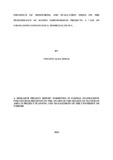Influence of Monitoring and Evaluation Tools on the Performance of Women Empowerment Projects: a Case of Changamwe Constituency, Mombasa County.
Abstract
The concept Women’s economic empowerment is a prerequisite for sustainable development
and pro-poor growth. Achieving women’s economic empowerment requires sound public
policies, a holistic approach and long-term commitment and gender-specific perspectives
must be integrated at the design stage of policy and programming. Project managers are
always looking forward to seeing public projects perform well. This involves finishing the
project on time, within budget, meeting end product specifications, meeting customer needs
and requirements and meeting management objectives. Despite the quest for project success,
many poverty eradication projects in Kenya have continuously experienced time overrun,
budget overrun, unmet end product specifications, unmet customer needs and requirements
and unmet management objectives (Auditor general’s report, 2008). The high failure rate in
these projects could be due to failure to use M & E tools in project activities. The purpose of
this study was to determine the influence of monitoring and evaluation tools on performance
of women empowerment projects in Changamwe constituency, Mombasa County. The study
was based on five research objective: Examine the extent to which the use of a budget
influences the performance of women empowerment projects, establish the extent to which
the use of a strategic plan influences the performance of women empowerment project,
determine the influence of stakeholder analysis on performance of women empowerment
projects, assess the extent to which the use of a logical framework influences performance of
women empowerment projects, determine the extent to which the use of an indicator matrix
influences the performance of women empowerment projects. The study was delimited to
completed projects that are funded by the government. The study applied descriptive research
design and used disproportionate stratified random sample to select the sample. The study
targeted 350 respondents; questionnaires with structured and unstructured questions were
used in data collection. Both qualitative and quantitative techniques were used to analyse the
data obtained from the field. Statistical package for social sciences (SPSS) and MS Excel
2010; were used in data management and analysis. SPSS was used to compute spearman rank
coefficient of correlation and it was found out that all the five M & E tools had strong
positive correlation on performance of women empowerment projects in Changamwe
constituency. It was also established that all the five independent variables had a significant
relationship with the dependent variable. The study recommends that the use of M & E tools
should be encouraged to ensure efficiency during operation of a project. The study also
recommends that stakeholders involved in M & E activities should be trained on the
necessary skills required to carry out these activities diligently and lastly stakeholders should
be involved from the inception of the projects to its operation and management phase for it to
be sustainable and also achieve its objectives.
Publisher
University of Nairobi
Subject
Women Empowerment ProjectsRights
Attribution-NonCommercial-NoDerivs 3.0 United StatesAttribution-NonCommercial-NoDerivs 3.0 United States
Usage Rights
http://creativecommons.org/licenses/by-nc-nd/3.0/us/http://creativecommons.org/licenses/by-nc-nd/3.0/us/
Collections
The following license files are associated with this item:


